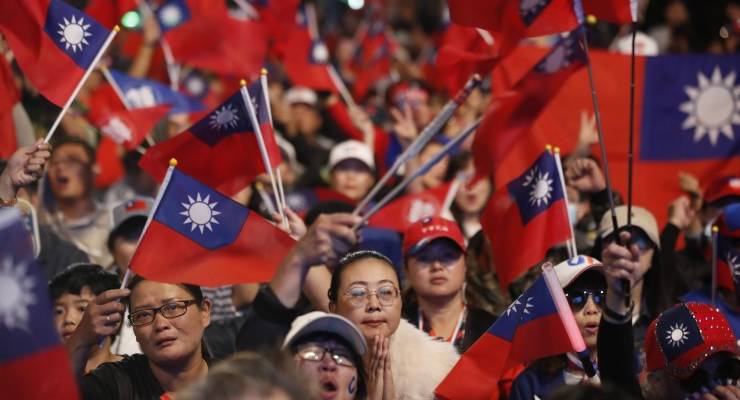
A concerted campaign by China’s ruling Communist Party to interfere in Taiwan’s presidential and legislative elections has failed — and perhaps even backfired — after President Tsai Ing-wen was overwhelmingly reelected at the weekend.
She captured a record 8 million votes and a majority of 57.1% in an election that had been increasingly seen as a referendum on ties with mainland China.
Tsai’s Democratic Progressive Party (DPP) also increased its majority in the country’s parliament. It has an outright majority of 61 seats versus the opposition Kuomintang’s (KMT) 38 and will no longer need smaller parties and independents to pass laws.
It’s been remarkable comeback for Tsai, whose popularity collapsed during her first term. She resigned as party chairman following disastrous mid-term local elections in 2018 which saw the DPP lose key mayoral races.
KMT populist Han Kuo-yu was elected mayor of Kaohsiung, Taiwan’s number two city and a DPP stronghold, and was subsequently selected as the pro-Beijing party’s presidential candidate. A year ago he seemed destined to limit Tsai to one term.
But just as Tsai began to creep back up in polls, Chinese leader Xi Jinping urged Taiwan to embrace unification under the “one country, two systems” Beijing uses to govern Hong Kong.
The message was ill-received, especially by younger Taiwanese. It was to prove a greater blunder once protests in nearby Hong Kong began in June. Han was forced to backpedal on his pro-Beijing message and never recovered. Tsai turned the screw by reasserting her party’s pro-independence message amid an economy benefiting from the US/China trade war.
While Australia should be cheered by this strong rebuff against China’s influence-peddling, Canberra has expressed next to no public support for the result, despite Australia’s strong trading relationship and close ties with Taiwan.
In contrast the United States voiced satisfaction, with a statement from Secretary of State Mike Pompeo congratulating Taiwan “for once again demonstrating the strength of its robust democratic system” which is “a model for the Indo-Pacific region and a force for good in the world”.
The American people and the people of Taiwan are not just partners — we are members of the same community of democracies, bonded by our shared political, economic, and international values.
Yet, despite the positive response in those countries concerned about an increasingly aggressive China — particularly in the South China Sea — Tsai’s win ensures that the Taiwan Strait remains the region’s most potent flashpoint.
China’s reaction to the election result has been furious. State media has issued its usual dark warnings, claiming “dirty tricks” had propelled Tsai’s victory, and that her reelection was “no doubt a development that deeply worries people who hope for peace and stability across the Taiwan Strait”. It asserted that China has “a full policy toolbox” to curb “Taiwan independence secessionist activities or to benefit Taiwan compatriots”.
Beijing is expected to extract further retribution by continuing to pressure allies and isolate Taiwan from major international forums under the so-called One-China policy.
Beijing’s economic heft mean many are unwilling to directly challenge its position on Taiwan. Certainly, countries — like Australia — that are overly dependent on trade with China are not ready to take the risk of challenging Xi Jinping.
The question is, if some plucky countries do begin rejecting the formula, will China’s diplomatic anger spill into military action? In the meantime, there is no reason that closer public relationships with Taiwan could not be part of a more gradualist global effort to realise Taiwan’s sovereignty.
Australia can play a constructive role here, and should be heartened by the election result. Taiwan has shown at the ballot box that its people have no desire to fall under the rule of the Chinese Communist Party, whose claims upon its sovereignty have always been highly questionable.








Crikey is committed to hosting lively discussions. Help us keep the conversation useful, interesting and welcoming. We aim to publish comments quickly in the interest of promoting robust conversation, but we’re a small team and we deploy filters to protect against legal risk. Occasionally your comment may be held up while we review, but we’re working as fast as we can to keep the conversation rolling.
The Crikey comment section is members-only content. Please subscribe to leave a comment.
The Crikey comment section is members-only content. Please login to leave a comment.